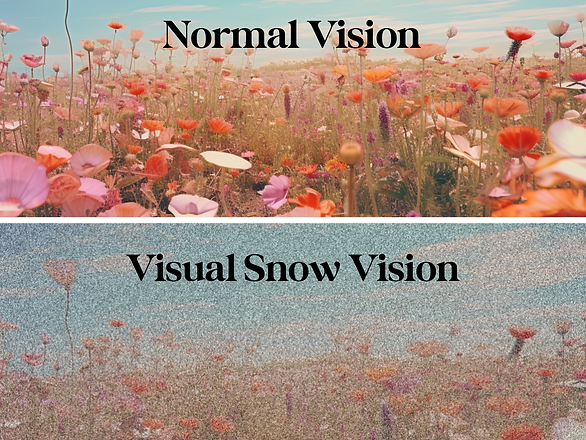I’ve got a feeling you’re either a proud member of the ‘Visual Snow Club’, or perhaps you’re a loved one to someone who is. Either way, welcome!
Does Visual Snow Get Worse? Asked and Answered.
Today, we’re going to answer a question that’s been nagging many of us: “Does visual snow get worse?” Answer: Yes, for a small number of patients Visual Snow will get worse AND –– No, for most patients Visual Snow will level off and maintain.

What on Earth is Visual Snow?
Picture a time you’ve watched an old TV that couldn’t find a channel. Remember that fuzzy, grainy screen, with tiny dots bouncing everywhere? It’s like a snowstorm on your TV. Now, imagine seeing that wherever you look. That, my friend, is visual snow.
People with VSS see the world a tad differently. It’s like we’re wearing funky glasses with a static filter. And no, we can’t just give them a tap to fix the channel!
The Million-Dollar Question: Does Visual Snow Get Worse?
Okay, here’s the scoop: the answer isn’t a simple yes or no. Some folks say their Visual Snow has stayed the same over the years. Others notice slight, or drastic, changes, for better or for worse. Visual Snow Syndrome can be unpredictable, which is and can be frustrating for patients living with this condition. Patients like me.
I’m in the minority, as my VSS has gotten worse over the years. On the flip side, I have communicated with thousands of other VSSers over the past 18 years and most do not have a worsening case.
In a long-term follow-up study titled “Natural course of visual snow syndrome,” researchers Michael Graber, Adrian Scutelnic, Antonia Klein, Francesca Puledda, Peter J. Goadsby, and Christoph J. Schankin delve into the progression of visual snow syndrome over time. This study, published in the 2022 issue of Brain Communications (Volume 4, Issue 5), aimed to understand the nature of this condition and how it affects patients in the long run. Some patients have reported a worsening of their visual snow syndrome symptoms over time. The research provides essential insights for clinicians, patients, and others interested in understanding the trajectory of visual snow syndrome. The full findings and details of this study can be accessed here, with the article published on 09 September 2022.
But What Does Science Say About Visual Snow Syndrome (VSS)?
Ah, trusty ol’ science! Here’s the thing: Researchers are still trying to figure out VSS. It’s a bit of a noggin-scratcher. There isn’t a mountain of studies on this, but from what we know, visual snow isn’t typically progressive in the opinion of some researchers. That means it doesn’t usually get worse over time.
Again though, playing devil’s advocate here for a moment, I have spoken with other researchers who have polled their patients and there is an undocumented pattern of worsening amongst many of these sufferers.
In the article titled “Visual Snow: A Review on Pathophysiology and Treatment,” authors Przemysław Rusztyn, Wiktoria Stańska, Anna Torbus, and Piotr Maciejewicz delve deeply into the underlying causes and potential treatment options for visual snow. Originating from the Department of Ophthalmology at the Medical University of Warsaw, Poland, this study not only offers insights into the complex nature of visual snow but also addresses the concerning issue of the syndrome worsening in some patients. The research is a significant contribution to the clinical understanding of visual snow, aiming to shed light on its progression and potential interventions. For those interested in a comprehensive understanding, the article is published in the J. Clin. Med. 2023, volume 12(12), and can be accessed here. The paper was received on 5 April 2023, underwent revisions, and was accepted on 2 June 2023, with its official publication date being 6 June 2023.
The Good News
While there’s no guarantee about what will happen with visual snow, many people live with it without major issues. Sure, it might feel like you’re in a perpetual snow globe, but life goes on!
Here are some positive vibes to consider:
- You’re Not Alone: Loads of people experience VSS. There’s a whole community out there, ready to chat, share, and give virtual high-fives.
- Adapt and Overcome: Humans are super adaptable. We’ve figured out how to make square watermelons and shoes that can tie themselves. Living with VSS is just another thing to adapt to!
- New Discoveries: Science is always making new discoveries. Who knows, maybe they’ll soon invent a treatment for VSS! (Or at least, one can hope, right?)
Tips for Living the VSS Life
Whether you’ve been in the ‘Visual Snow Club’ for ages or you’re a newbie, here are some tips that might help:
- Adjust Your Environment: Soft lighting can be easier on the eyes. So, if your room looks like a stadium during a night game, maybe tone it down a bit.
- Limit Screen Time: I know, I know, it’s 2024 and screens are everywhere. But give those peepers a break every once in a while. Plus, the real world has some pretty cool graphics.
- Use FL-41 Tinted Glasses
- Wear Sunglasses Outside: Sunglasses are a huge help to me to cut the light, glare, and floaters.
- Stay Positive: Not all hope is lost, there is research being conducted from the UK to Australia.
Final Thoughts
Trying to understand this syndrome is like trying to solve a big puzzle. Some people find that their visual snow gets stronger over time, while others don’t see any change. When scientists look into this, they find different answers. Some say it doesn’t usually get worse, but others have found that it can for some people.
Even with so many unanswered questions, it’s heartening to see a strong community of people with visual snow, including supportive groups like the Eye on Vision Foundation. Plus, dedicated scientists globally are putting in great efforts to unravel the mysteries of visual snow.



